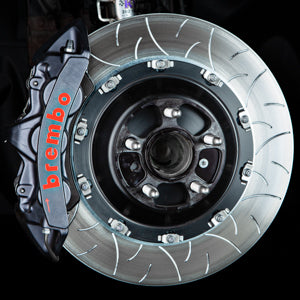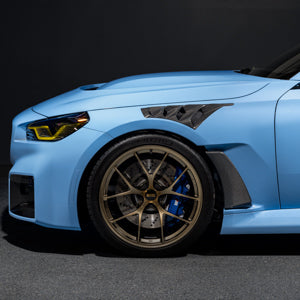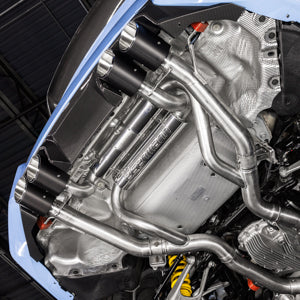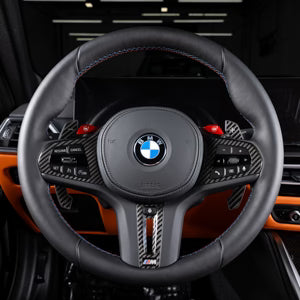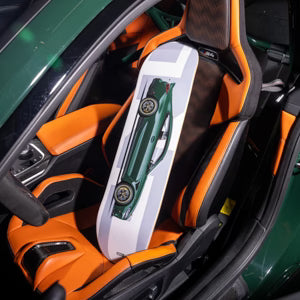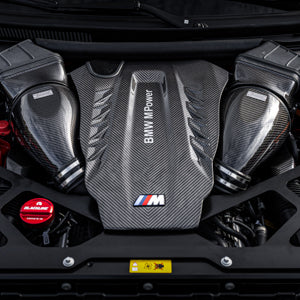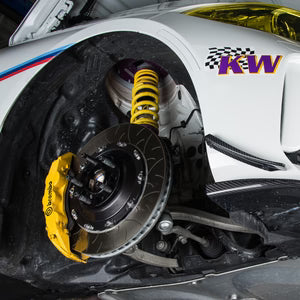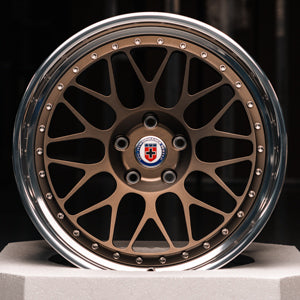The F90 M5 Eventuri intake system was developed through extensive real world testing and airflow simulation analysis. Now in the updated V2 design, it features sealed filter housings to maintain a more steady IAT, even while stationary. The new shrouds which seal the housings, coupled with our scoop and shield combination ensures unrestricted airflow whilst maintaining low IATs through cold air saturation. Our large front air scoops transfer ambient air directly into the intake area thus ensuring the engine doesn’t suffer from heat soak. In addition, our gold heat-reflective lined shields have integrated flow guides which direct the ambient air from the scoops into the filters. We have also managed to increase the inlet tube cross-sectional area by over 30% compared to the stock intake as it feeds through the openings in the strut braces. This allows the turbos to work more with less restriction and reduce the waste-gate duty cycles.
The shrouds are crafted from prepreg carbon fiber and will now be included on all new F90 M5 systems. They are also available for those who have the V1 intake system.
Each intake system consists of:
- 2 x Carbon Fiber Venturi Housings with Integrated Tubes
- 2 x Bespoke High Flow Generation 2 Filters
- 2 x Carbon Fiber Filter Shrouds
- 2 x Aluminium Inlet Cowls
- 2 x Carbon Fiber Air Scoops
- 2 x Laser Cut Heat Shields lined with Gold Heat Reflective Material
- 2 x Laser Cut Air Ramps integrated into the Heat Shields
- High Quality Silicon Couplers and OEM Spec Hose Clamps
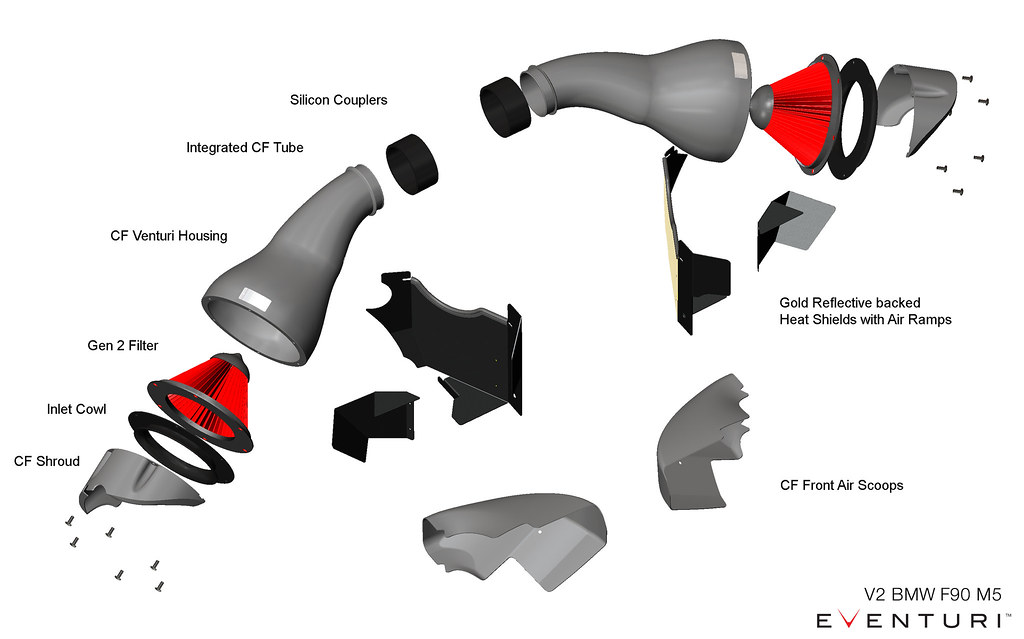
INTAKE HOUSING ASSEMBLY 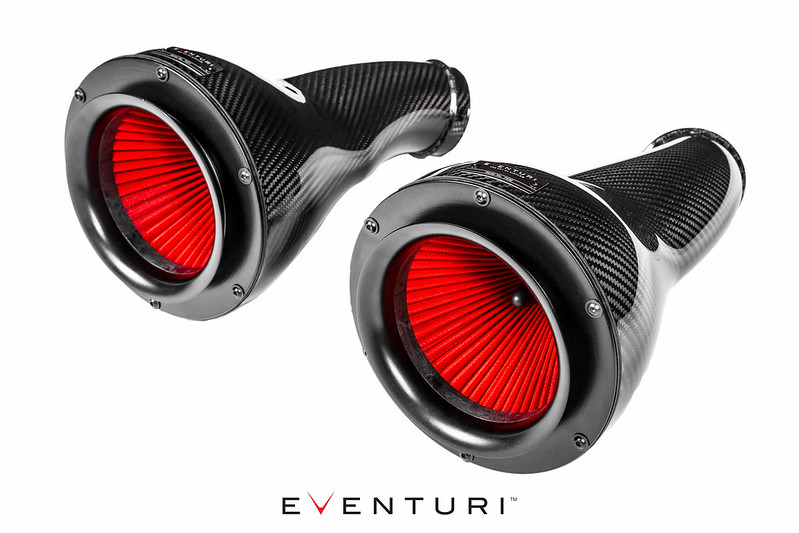
The filter housings comprise of our bespoke generation 2 filters, aluminium inlet cowls, carbon shrouds, the carbon pods and integrated tubes. The carbon pods shroud the reverse mounted filters and smoothly shape the airflow down to the stock turbo inlet tubes. This is a key feature of the intake design where we have removed the requirement for a convoluted rubber hose between the airbox and the turbo inlet tubes. The filter housings and integrated tubes extend all the way to the stock turbo tubes and are able to move as one piece with the engine through the strut braces. This removes the extra interfaces of having a separate convoluted tube which the stock system requires for flexibility as the stock airboxes are mounted to the chassis so cannot move. The result is a smoother path from the filter to the turbo inlets and therefore the turbos are able to function with less drag. The diagram below summarises the differences between the stock airbox and the Eventuri F90 filter housing. 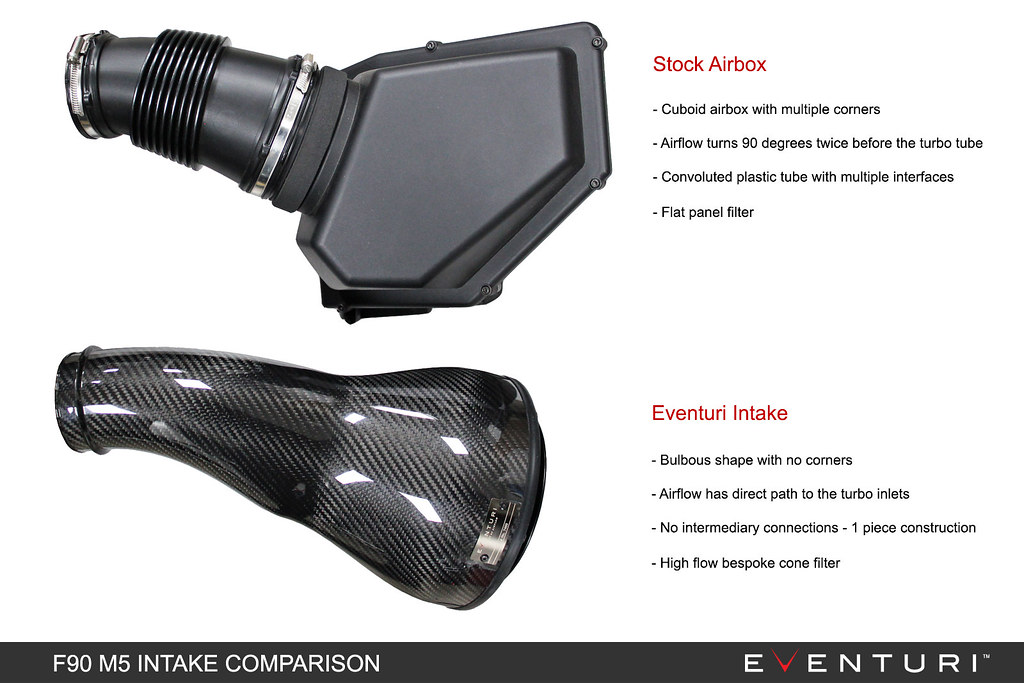
INTERNAL VOLUME
Another key design feature of the intake housings is the internal volumes of the tubing as they pass through the strut braces. On the F90 M5, the airbox system must pass through an oval opening in the strut brace on each side before reaching the turbo inlets. We have managed to increase the internal size of our intakes at this junction which results in more available volume for the turbos to draw from and therefore less restriction. The increase in cross sectional areas between the Eventuri and the stock airbox is 31% as follows:
- Internal Cross Sectional Area of intake tube at the strut brace:
- Stock Airbox Tube = 6487mm²
- Eventuri Intake Tube = 8497mm²
PATENTED TECHNOLOGY
Our patented filter housings have a smooth reduction in cross sectional area as they shroud the filters and taper down to the tubing. This geometry invokes the Venturi effect where the airflow accelerates whilst maintaining laminar conditions. It can be thought of as a large velocity stack - below is a diagram to show the comparison between our patented design and a regular intake system. Our bespoke filters aid the airflow moving through the housings and allow for an even velocity profile as the airflow exits the housings. Further details can be read in the Technology and Filters pages. 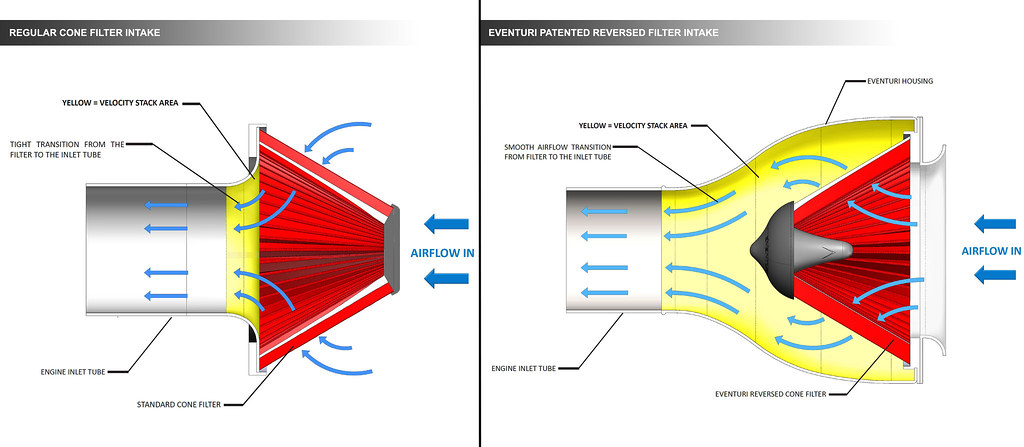
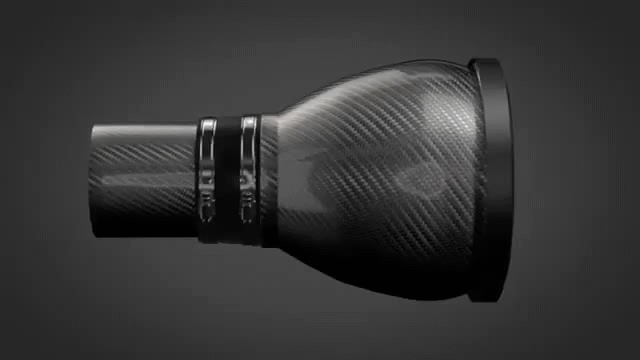
CARBON SHROUDS 
These Carbon shrouds are a recent addition to this intake system. They seal the openings in front of the filter housings from the engine bay whilst still allowing for the air flow to enter the filters from the front scoops. The shrouds follow the design curves of the housings and extend to the inside wheel arches where a rubber seal allows for movement of the intakes with the engine. Made from the same high quality prepreg carbon fiber as the housings, the shrouds finish off the intake system beautifully.
HEAT SHIELDS AND AIR RAMPS 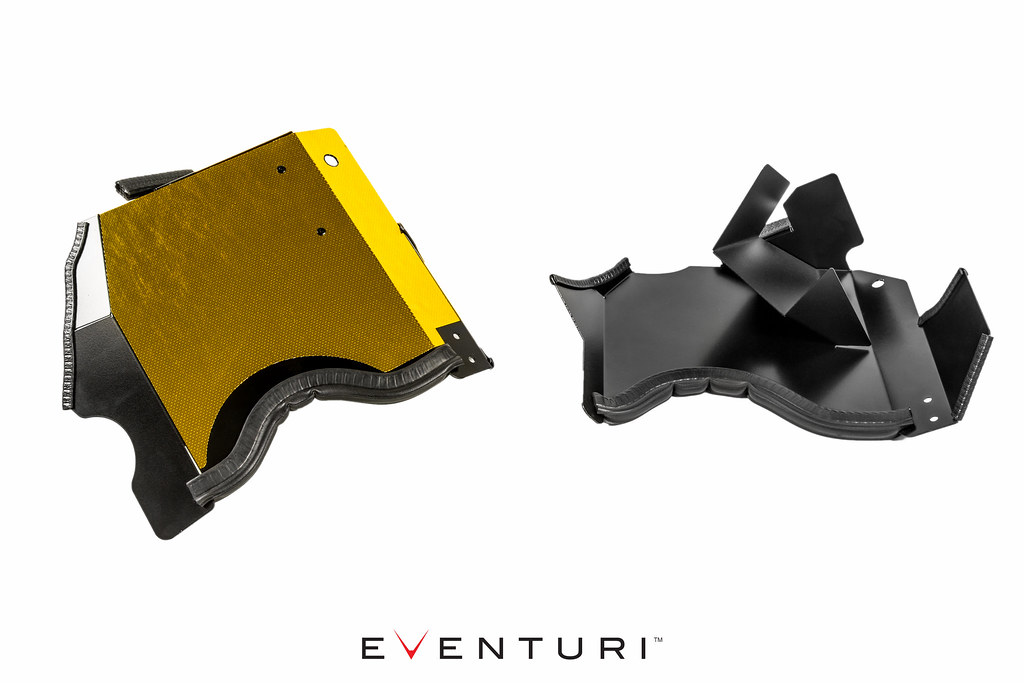
The filter housings sit on top of these laser cut shields which also have a gold reflective backing to aid against radiated heat transfer. The shields attach to the chassis and also provide an enclosure for the openings of the housings to draw cool air from. This is aided by the integrated air ramps fixed to the inside of each shield. These ramps guide the air from the scoops upwards to the filters so when the car is in motion - the airflow being forced into the ducts from the front scoops is then directly pushed into the filter area displacing any engine bay heat.
FRONT SCOOPS 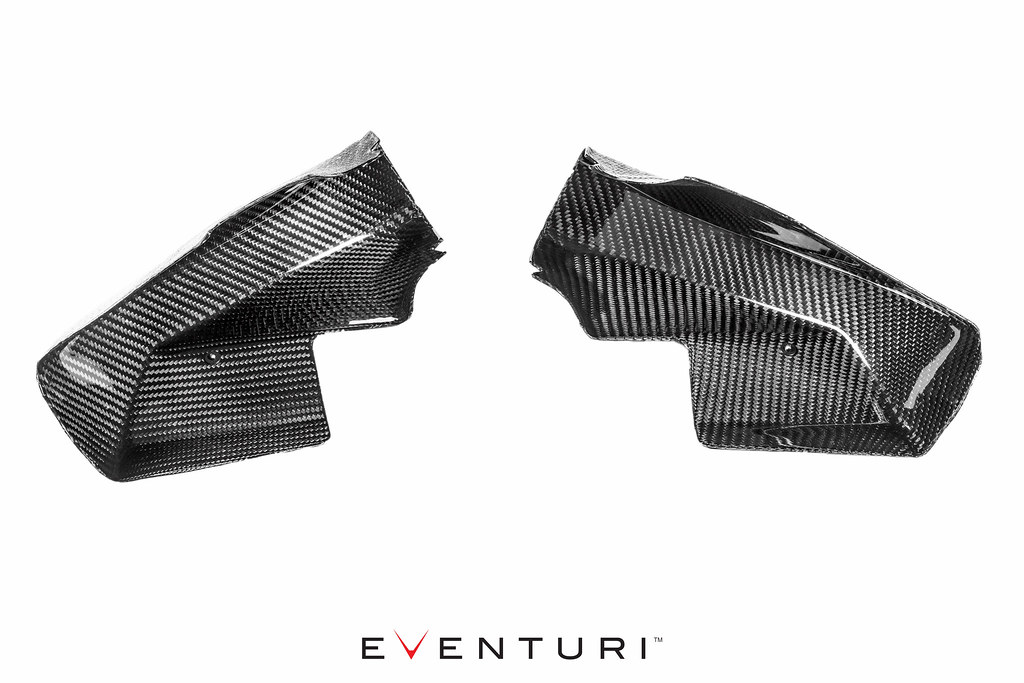
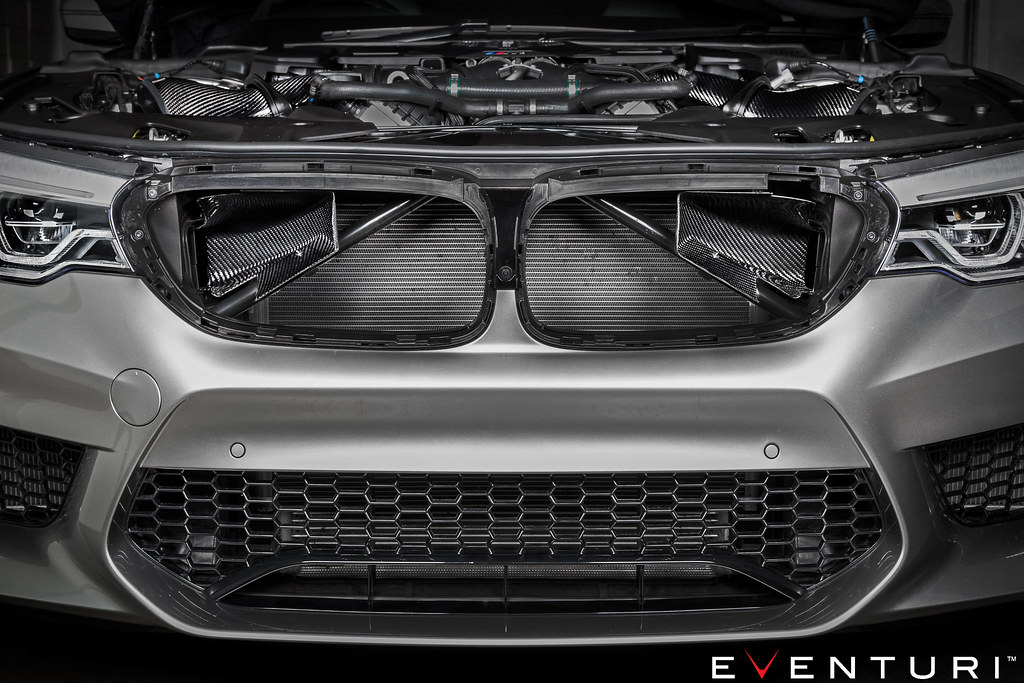
The final carbon components in this system are the front scoops - essential to direct ambient air to the filters.
The scoops were designed for maximum efficiency in directing the incoming air to the stock duct openings. Many aftermarket scoops have a large flat area almost perpendicular to the oncoming air - not great for channeling it into the ducts as the airflow just "hits" this flat portion and creates turbulence.
Unlike most aftermarket "scoops" the Eventuri Scoops have been designed extend from the stock duct openings all the way to the grills. In order to capture as much air as possible, the scoops are shaped to the same contours as the outsides of the grills and then smoothly channel ambient air through a continuous curve to the duct openings. CAD images to illustrate the shape: 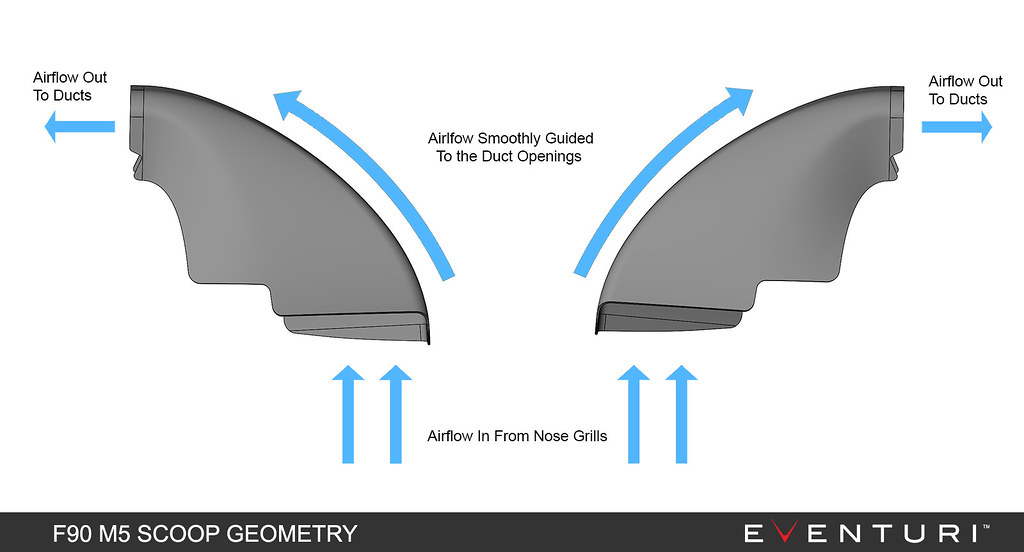
Having an effective cold air feed to the filters is an essential part of our design. Simply having some heat shields in place is not an effective means of avoiding heated air from entering the filters unless the shields create an air tight envelope around the filters. The scoops and shields in our system combine to provide the filter openings with ambient air and maintain low intake air temperature.
